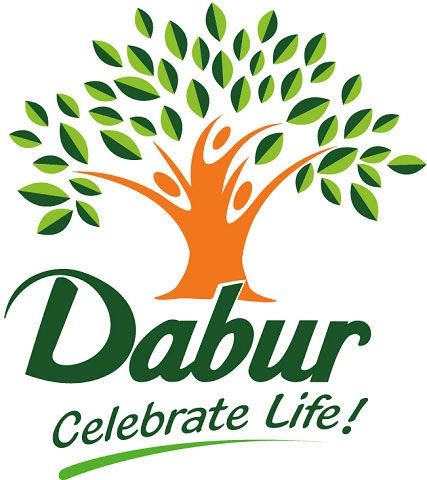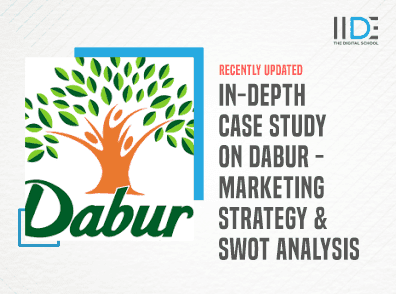
Orginally Written by Aditya Shastri
Updated on Dec 11, 2025
Share on:


Learn Digital Marketing for FREE


About Dabur
Dabur India Ltd stands as a titan in the Indian FMCG landscape, with a legacy that spans over a century. Founded by the visionary Dr. S.K. Burman in 1884, this company started from humble beginnings and has grown into a colossal enterprise. Today, Dabur boasts an impressive market capitalisation of over ₹89,293 crore and annual revenues of ₹11,975 crore.
Dabur’s diverse product portfolio includes everything from hair and oral care to health care, skin care, home care, and packaged food. This wide range of offerings reflects the company’s commitment to improving everyday lives through trusted, high-quality products.
1996 Dabur took a significant step by becoming a public limited company. Four years later, it achieved a remarkable milestone, surpassing a turnover of ₹1,000 crore. Dabur established three specialised divisions to streamline its operations and management: Goods for Health Care, Family Products, and Dabur Ayurvedic Specialties.
Dabur’s influence stretches far beyond India’s borders. The company enjoys a substantial international presence with its products reaching over 100 countries. Remarkably, its overseas revenue now represents more than 27% of its total turnover, underscoring its global appeal and success.
Dabur’s journey from a small enterprise to a global FMCG leader is a testament to its innovation, resilience, and commitment to quality.
Big companies like Dabur seek digital marketing professionals to take their marketing campaigns up a notch. Many aspirants who want to work in such companies start looking for a digital marketing course to begin their careers in this dynamic industry.
Dabur Case Study – What’s New With the Company?
- Revenue (2023): The marketing strategy of Dabur has contributed significantly to the company’s revenue, which stood at ₹11,530 crore (Source: Dabur Annual Report 2023).
- Market Share: Dabur holds 5.3% of the Indian FMCG market (Source: Statista).
- Product Range: The company offers over 500 products across various categories, including health, personal care, and food (Source: Dabur Corporate).
- Employee Strength: Dabur employs approximately 7,500 people globally (Source: Dabur Corporate).
Curious to learn about how companies like Dabur leverage market trends to design their campaigns and earn such high revenues? Check out our digital marketing course with placement so that you can learn and implement what you have learned in real-life scenarios.
1. Business News
All thanks to Dabur’s marketing strategy, In 2023, the company reported a revenue increase of 11%, reaching INR 10,800 crores, driven by strong demand in both the domestic and international markets.
2. Product Launch
Dabur recently expanded its wellness segment by launching an immunity-boosting product line under the Chyawanprash brand, catering to growing health concerns post-pandemic.
3. Marketing News
Dabur introduced a new digital campaign, ‘Ayurveda for All,’ emphasising the accessibility and benefits of Ayurveda, a key component of Dabur’s marketing strategy.
Want to understand the factors that a company considers while designing the marketing strategy of Dabur? Check out our best online marketing courses to understand this from a marketer’s point of view.
4. Celebrity News
Keeping in line with the Dabur advertising strategy, the company partnered with actor Akshay Kumar for a campaign to promote Dabur Honey, reinforcing their commitment to healthy living and wellness awareness.
Based on the detailed breakdown, it’s no surprise that Dabur’s marketing strategy leverages social media platforms like Facebook (now Meta) and Instagram to execute its marketing campaign. Here, the company can feature health and wellness that meet the requirements of Dabur’s target audience.
Many AI tools like ChatGPT can help generate content tailored to various social media platforms. Check out our free ChatGPT course and leverage its power now!
Power Product Mix of Dabur
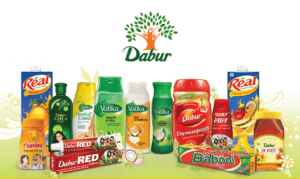
Source: Google
- Dabur Chyawanprash: Dabur Chyawanprash, renowned as the elixir of life, is a time-honoured Ayurvedic blend comprising over 41 potent herbs, crafted to bolster the immune system and safeguard the body against daily infections. With 26 million units sold annually, it’s a key component in Dabur’s marketing strategy and a testament to its successful Dabur case study.
- Dabur Honey: Dabur Honey stands out as the largest branded honey in the nation, promoting fitness and a wholesome lifestyle while enhancing the immune system. This product reflects Dabur’s brand strategy and is vital to its digital marketing strategy.
- Dabur Honitus: This Ayurvedic remedy for cough, which does not induce drowsiness, is clinically validated to alleviate acute cough and throat irritation swiftly. Gross sales amounting to Rs 100 demonstrate the effectiveness of Dabur’s marketing strategy and align it with its advertising strategy.
- Dabur Lal Tail: Clinically tested for safety, Dabur Lal Tail strengthens babies’ bones and muscles, offering skin protection and a natural glow. Proven to accelerate physical growth by twice the normal rate, this product’s success is a key example of Dabur’s promotional strategies. In 2022-23, 17.1 lakh litres were sold, highlighting its strong market positioning in the dabur product mix.
- Dabur Pudin Hara: As an Ayurvedic remedy for indigestion, gas, and acidity, Dabur Pudin Hara is renowned for its rapid relief from stomach discomfort. It is an integral part of the dabur marketing strategy and contributes to the overall dabur marketing campaign.
- Dabur Amla Hair Oil: India’s top-selling hair oil brand, Dabur Amla Hair Oil, has been the preferred choice for generations. It is enriched with amla extracts to reduce dandruff and maintain natural hair colour. This product is a significant component of Dabur’s marketing strategy and market positioning.
- Dabur Red Paste: Containing 13 powerful Ayurvedic ingredients, Dabur Red Paste defends against seven dental issues, including cavities and gingivitis. It exemplifies the successful dabur marketing strategy and dabur promotional strategies.
- Real: As the newest addition to the Dabur portfolio, Real is packed with authentic fruits and is free from added colours or preservatives. This new product showcases Dabur’s innovative approach and is a key element in their ongoing Dabur brand strategy.
Marketing Strategy of Dabur
A marketing strategy is a long-term plan devised to promote a company’s goods and services. Strategies are comprehensive plans aimed at achieving organisational goals, with marketing specifically focusing on the sale or promotion of products and services, prioritising customer satisfaction.
Dabur launched its community-based initiative, ‘My 10 Kg Plastic’, in Jammu city on 6th September 2023. This promotion fosters consumer engagement and builds stronger emotional connections, aligning with Dabur’s CSR efforts and positioning the brand as socially conscious in the market. This initiative is a significant element of the Dabur case study and showcases part of the company’s marketing strategy.
In August 2023, Dabur Lal Tail released a new advertisement for Independence Day, highlighting the theme of building a stronger India and celebrating a mother’s love through generations. The ad revolves around a heartwarming story of a young mother using Dabur Lal Tail for her child’s well-being, echoing the traditions of her own childhood. This reflects the Dabur marketing strategy that emphasises emotional storytelling and tradition, enhancing the Dabur brand strategy.
In October 2023, Dabur Fem launched its latest campaign, #GlowOfLove. The campaign features a contemporary live-in couple observing Karwa Chauth without informing each other, exploring the fusion of tradition with modern relationships. This narrative highlights the resilience of age-old traditions in adapting to modern life. It is a prime example of Dabur’s marketing campaign that integrates traditional values with modern-day relevance. The campaign underscores Dabur’s promotional strategies and illustrates the company’s ability to resonate with contemporary audiences while maintaining Dabur’s market positioning.
Dabur’s marketing strategy aims to continue its brand image by providing various products and using print media and sales promotion to reach out to its customers.
Are you curious to learn how a successfully designed marketing strategy can reap returns in the long run? A free digital marketing certification will help you understand this in detail.
Digital Marketing Strategy of Dabur
Dabur, traditionally known for its use of conventional promotional mediums, is now shifting its focus to a digital-first approach. In a revealing interview with BrandEquity, A.C. Burman, the Chairman of Dabur, elaborated on the company’s strategic pivot towards digital marketing and how they plan to redirect their marketing efforts to newer, more contemporary platforms.
Dabur is embracing the digital revolution by implementing a robust digital marketing strategy to tap into the growing market of millennials and Gen Z. The company runs targeted campaigns across various digital platforms and ensures seamless product availability through enhanced e-commerce and online marketplaces. This transition reflects Dabur’s understanding that social media and digital channels offer greater effectiveness than traditional promotion methods, leading the path to better Darbur promotional strategy formation.
The shift in Dabur’s marketing strategy is driven by the recognition that digital platforms provide a significant advantage in terms of reach and impact. Over recent years, Dabur has significantly increased its digital spending. Since 2017, the company ramped up its investment in digital marketing by 33% in 2018, with a total expenditure of ₹1.99 billion for 2018-19.
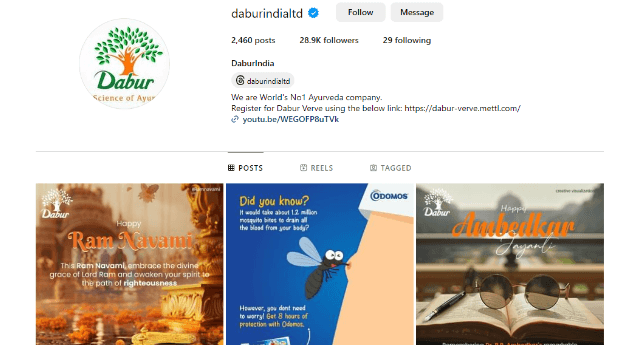
Source: Instagram
Another aspect that Dabur wishes to capitalise on is the e-commerce store trend. These e-commerce stores have shown their efficiency and effectiveness in the Indian market. Dabur pushes its products through multiple e-commerce stores and targets fitness-conscious millennials as a part of its digital strategy.
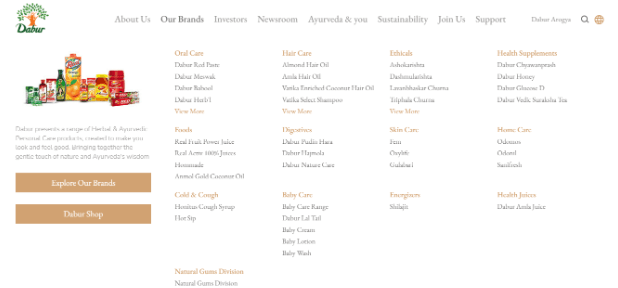
Source: Dabur.com
The brand directly boosts sales through e-commerce platforms like Amazon from its official website.
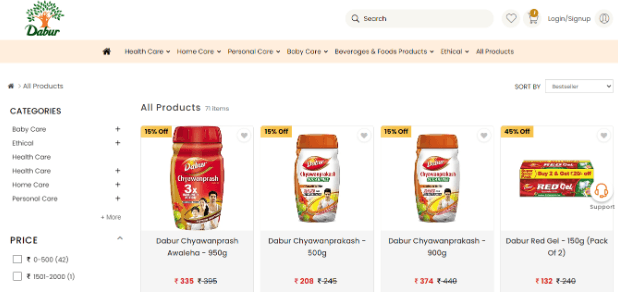
Source: Dabur.com
They also have a separate e-commerce website, ‘https://www.daburshop.com/’, where they sell their products directly to the consumers.
People across the country, especially the ones residing in Mumbai and Gurgaon, want to experiment with various digital marketing strategies. This has led them to search for information using the keywords ‘digital marketing courses in Mumbai’ and ‘digital marketing courses in Gurgaon’.
Marketing and Advertising Campaigns of Dabur
Dabur already holds on to print and television advertising and recently is planning to take over digital media as a medium for advertising its products.
Dabur Vatika Salutation to Cancer Fighter

Source: Google
In a poignant gesture, Dabur Vatika’s recent advertising campaign pays homage to cancer patients, acknowledging their strength and resilience. This emotionally resonant commercial is designed to touch the hearts of its primary audience—predominantly women who use Dabur Vatika.
By incorporating such a deeply personal element, the Dabur marketing campaign enhances Dabur’s brand strategy and aligns with its broader Dabur advertising strategy. This approach reflects Dabur’s consumer marketing and growth strategy, which aims to foster a deeper connection with its audience while demonstrating its commitment to social causes.
Dabur Amla – The Original Hair Oil
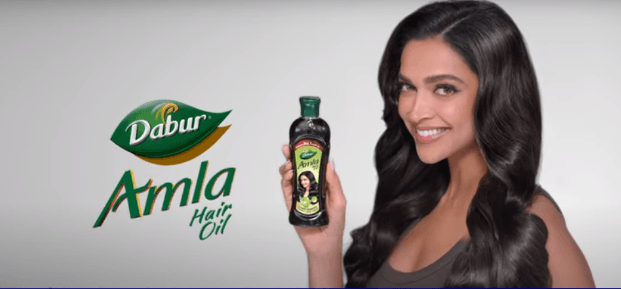
Source: Google
In recent Dabur Amla hair oil ads, Dabur’s marketing strategy featured Deepika Padukone for the product’s promotion, where she shops with a friend, choosing Dabur Amla and saying that as the original. She highlights its benefits, like vitamin C, antioxidants, and omega-3, for stronger, healthier hair.
Bonus Read: Influencer Marketing Strategies
Dabur Vatika Ayurvedic Shampoo
Celebrity endorsements have helped Vatika reach a wider audience and attract new customers. Many of their television advertisements feature Kareena Kapoor Khan and Samantha Ruth Prabhu, which is likely to be an advantage for the brand in terms of increasing visibility and credibility in the market.
Would you like to research the marketing strategies of other well-known brands? Have a look at our digital marketing case studies now!
The Marketing Strategy of Dabur That Failed
The Fem Creme bleach ad by Dabur showcased two women celebrating their first Karva Chauth together, which was intended to highlight inclusivity and progressive values. The ad featured the women performing traditional rituals of the Hindu festival while promoting Dabur’s product.
Issue: The advertisement for Dabur’s Fem Creme bleach shows two ladies celebrating their first Karva Chauth. The commercial drew mixed reactions: whilst many people praised it for its inclusivity, a few objected to Hindu festivals being misused.
Backlash: Madhya Pradesh Home Minister Narottam Mishra said he had directed the Director General of Police (DGP) to ask the company to withdraw the advertisement. He also told reporters that he considered this a serious matter because the ad portrayed Hindu festivals in a way that hurt religious sentiments, particularly showing lesbians performing the Karva Chauth ritual.
Brand Response: Dabur responded by pulling down the Fem Creme Bleach ad after facing backlash, acknowledging the sensitivity around religious festivals and the need for more thoughtful and responsible advertising.
Many businesses across India, especially the ones operating in Calgary and Patna, face marketing challenges, but there’s a way to overcome them! Enrolling on one of the best digital marketing courses in Calgary, along with the best digital marketing courses in Patna, will provide you with valuable information about the right way to deal with such pitfalls.
Top 5 Competitors of Dabur
- Hindustan Unilever Limited (HUL) was established in 1933 and has been a part of India’s consumer goods market for over 90 years. They offer products in domestic care, personal care, meals, and liquid. Brands like Surf Excel, Vaseline, Dove, Lipton, and many others come under HUL, which Indian families rely on for its quality and convenience.
- Emami was founded in 1974. It is a well-established company celebrated for its various personal care and healthcare products. Their portfolio includes popular brands like Navratna, Boroplus, Fair and Handsome, and Zandu, offering a variety of skincare, wellness, and grooming solutions.
- Patanjali Ayurved Limited was established in 2006 by Ramdev and Balkrishna. Their core focus revolves around traditional Indian Ayurvedic principles, strongly emphasising incorporating natural ingredients such as herbs and spices into their products. They utilise natural remedies for personal care and overall health enhancement.
- Himalaya Herbals is a famous brand established in 1930. It is renowned for its commitment to Ayurveda and offers a range of natural and herbal products, including skincare, haircare, and wellness. Their face wash and soap are more popular than others.
- Marico is a leading company in health, beauty, and wellness products and has a presence in over 25 countries in Asia and Africa. It was established by Harsh Mariwala in 1990 and has gained recognition for nurturing top brands across hair and skin care, cooking oils, immunity-boosting foods, male grooming, and fabric care.
Buyers Persona:

Sabana Yashmin
Tamilnadu
Occupation: Graduate
Age: 22 years
Motivation
- Ayurvedic tradition
- Natural and Quality Products
- Health and wellness
Interest & Hobbies
- Cycling
- Shopping
- Reading blogs
- Listening to music/podcast
- Learning new skills
Pain Points
- Changing consumer preferences
- Digital transformation
- Consumer awareness
- Product imitation
- Competition in the market
Social Media Presence
- Youtube
Want to Know Why 2,50,000+ Students Trust Us?
Dive into the numbers that make us the #1 choice for career success

MBA - Level
Post Graduate in Digital Marketing & Strategy
Best For
Fresh Graduates
Mode of Learning
On Campus (Mumbai & Delhi)
Starts from
Mar 23, 2026
Duration
11 Months
Live & Online
Advanced Online Digital Marketing Course
Best For
Working Professionals
Mode of Learning
Online
Starts from
Mar 6, 2026
Duration
4-6 Months

Online
Professional Certification in AI Strategy
Best For
AI Enthusiasts
Mode of Learning
Online
Duration
5 Months

Offline
Undergraduate Program in Digital Business & Entrepreneurship
Best For
12th Passouts
Mode of Learning
On Campus (Mumbai)
Duration
3 Years
Recent Post
You May Also Like
The Dabur marketing strategy revolves around promoting its natural and Ayurvedic heritage. The brand emphasises sustainability and health-focused products, aiming to target health-conscious consumers while maintaining a strong connection with traditional values.
Dabur uses its market positioning to highlight its Ayurvedic expertise and natural product offerings. The brand focuses on health and wellness, positioning itself as a leader in holistic, herbal solutions across personal care, healthcare, and food segments.
The vast Dabur product mix covers personal care, healthcare, and food products. From hair oils to honey, Dabur's range is centred on natural and Ayurvedic formulations, catering to various consumer needs with diverse product lines.
Dabur's promotional strategies combine traditional advertising with digital marketing. Campaigns like Dabur Red Toothpaste and Real Juice leverage television, print, and digital platforms to engage consumers, ensuring a wide-reaching and effective brand presence.
Dabur's digital marketing strategy is leveraging social media, influencer marketing, and e-commerce platforms to reach tech-savvy and health-conscious consumers, expanding its digital footprint through engaging content and targeted online campaigns.
One notable Dabur marketing campaign is the 'Dabur Chyawanprash Immunity Campaign,' which emphasised immunity-boosting products during the pandemic. It leveraged social media and celebrity endorsements to reinforce Dabur's expertise in natural healthcare.
Dabur maintains consumer trust through a consistent brand strategy by offering quality natural products and preserving its Ayurvedic heritage. The brand builds strong loyalty across generations by focusing on consumer health and sustainability.
Aditya Shastri leads the Business Development segment at IIDE and is a seasoned Content Marketing expert. With over a decade of experience, Aditya has trained more than 20,000 students and professionals in digital marketing, collaborating with prestigious institutions and corporations such as Jet Airways, Godrej Professionals, Pfizer, Mahindra Group, Publicis Worldwide, and many others. His ability to simplify complex marketing concepts, combined with his engaging teaching style, has earned him widespread admiration from students and professionals alike.
Aditya has spearheaded IIDE’s B2B growth, forging partnerships with over 40 higher education institutions across India to upskill students in digital marketing and business skills. As a visiting faculty member at top institutions like IIT Bhilai, Mithibai College, Amity University, and SRCC, he continues to influence the next generation of marketers.
Apart from his marketing expertise, Aditya is also a spiritual speaker, often traveling internationally to share insights on spirituality. His unique blend of digital marketing proficiency and spiritual wisdom makes him a highly respected figure in both fields.

